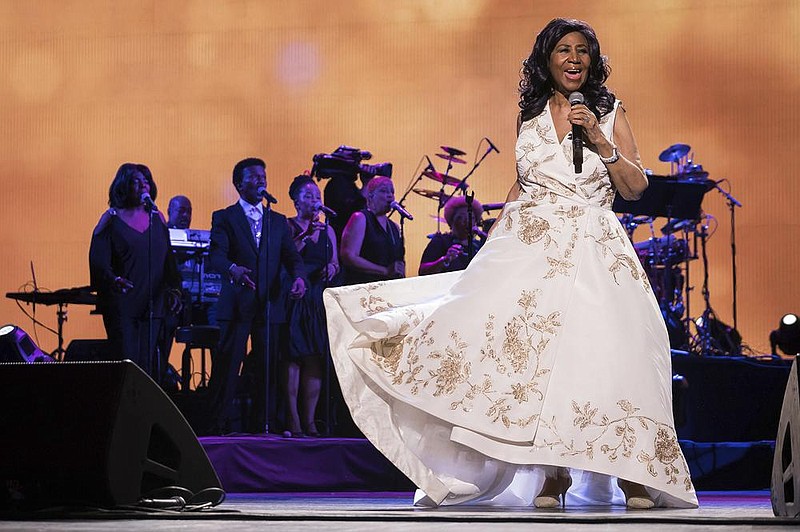Pop critics for The New York Times weigh in on notable new songs and videos.
• Aretha Franklin featuring the Boys Choir of Harlem, "Never Gonna Break My Faith." Aretha Franklin's "Never Gonna Break My Faith" first appeared on the soundtrack for Bobby, the 2006 film about Robert F. Kennedy. Written by Bryan Adams, Andrea Remanda and Eliot Kennedy, it was a duet with Mary J. Blige backed by the Boys Choir of Harlem, affirming faith in the face of racism and killing. "When someone takes the life of an innocent man," the song insists, "Well they've never really won, and all they've really done/is set the soul free." Rediscovered for this political moment, the new version removes Blige's part to have Franklin sing all the way through, as she transfigures rage into tenacity.
-- JON PARELES
• H.E.R., "I Can't Breathe." This song is a lament that harks back to the patient pace of Bill Withers' "Ain't No Sunshine," alternating two chords as it asks pained questions: "Where is the hope and the empathy?" H.E.R. sings. "I can't breathe -- will anyone fight for me?"
-- JON PARELES
• Anderson .Paak, "Lockdown." Anderson .Paak treats the convergence of the pandemic, a plunging economy and nationwide protests with a potently unexpected attitude: nonchalance. Electric-piano chords and syncopated guitar picking define a smooth-jazz groove, while he raps and sings without raising his voice as if he's just watching the world go by. But that world is in turmoil. "They throw away black lives like paper towels/Plus unemployment rate, what, 40 million now?/Killed a man in broad day might never see a trial" he declaims, calmly and precisely, as if -- and because -- in large parts of America, crisis conditions are nothing new.
-- JON PARELES
• Celeste, "I Can See the Change." Celeste, a British singer, is staking out her place as a singer defying Auto-Tune to waver and swoop like Amy Winehouse and, perhaps, Billie Holiday. "I Can See the Change," accompanied by piano chords and electronics and produced by Finneas (the brother and collaborator of Billie Eilish), negotiates the digital and human, striving to stay embodied: "I am what remains, standing here in spite of everything," she promises.
-- JON PARELES
• Rudresh Mahanthappa, "Dewey Square." Five years ago, alto saxophonist Rudresh Mahanthappa released Bird Calls, an album full of elastic originals based around the work of Charlie Parker. But Mahanthappa still had never made a record devoted to actually playing other people's compositions, until now. Hero Trio features the same rhythm section as Bird Calls (Francois Moutin on bass, Rudy Royston on drums), and it begins and ends with tunes by Parker. On "Dewey Square," the album's closer, Moutin resists this classic piece's harmonic motion, hammering away on a minor vamp while Mahanthappa maintains the shape and flow of the original.
-- GIOVANNI
RUSSONELLO
• Luh Kel, "How to Love." A tender singer with a voice reminiscent of Jeremih, Luh Kel is promising and disarming. Like his breakthrough single "Wrong," the new "How to Love" is filled with ache and spare, with an arrangement verging on adult contemporary R&B. But his lyrics carry all the sting of youthful heartbreak: "Know I messed up when I gave you my heart/you left me out there just to bleed."
-- JON CARAMANICA
• Saweetie, "Tap In." Saweetie likes to taunt and boast in equal measure. (See also: "My Type.") On the pleasantly raunchy and comic "Tap In," she repurposes the beat from Too Short's bulbous "Blow the Whistle" and coolly brags about what it takes to entice a man, and then about how to keep that man in his place. The result is offhandedly cinematic and eye-bulgingly vivid.
-- JON CARAMANICA
• Micah Thomas, "Grounds." Only occasionally -- a few times in a generation, even -- does a pianist come along who seems to have gobbled up and processed so much music, their style can make sense of both jazz's history and its present in a single motion. Micah Thomas is one of those players. On Friday he released his debut album, "Tide," recorded with his young trio-mates at a club gig in New York last year. On an album full of varicolored, gemlike originals, "Grounds" is the standout; it was nominally inspired by Gustav Mahler's "Symphony No. 6," but as with everything Thomas plays, it's an overflow situation: Traces of Jason Moran, Albert Ayler, Cape jazz, J.S. Bach all tumble into the mix.
-- GIOVANNI
RUSSONELLO
